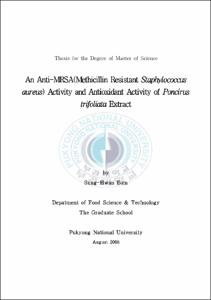An Anti-MRSA(Methicillin Resistant Staphylococcus aureus) Activity and Antioxidant Activity of Poncirus trifoliata Extract
- Alternative Title
- 탱자열매 추출물의 항메티실린 내성 황색포도상구균에 대한 항균활성 및 항산화 활성
- Abstract
- Poncirus trifoliata (L.) Raf. (Rutaceae) is widely used as traditional folk medicine in East Asia as a remedy for gastritis, dysentery, inflammation, and digestive ulcers. It has been studied for their potential uses as alternative remedies for the treatment of many infectious diseases and the preservation of the foods from the toxic effects of the oxidants. Particularly, the antimicrobial activities of plant and extract have formed the basis of many applications, including raw and processed food preservation, pharmaceuticals, alternative medicine and natural therapies.
In an effort to discover an alternative therapeutic agent against methicillin resistance Staphylococcus aureus (MRSA), several medicinal plants were evaluated for its antibacterial activity against MRSA. A methanolic extract of Poncirus trifoliata exhibited significant antibacterial activity against MRSA. To perform more detailed investigation on antibacterial activity, the methanol extract of P. trifoliata was further fractionated with organic solvents such as n-hexane, dichloromethane, ethyl acetate, and n-butanol. Among them, the ethyl acetate fraction showed the highest antibacterial activity against 9 MRSA strains with minimum inhibitory concentration (MIC) from 256 to 1,024 μg/㎖.
Also, the each fraction was subjected to investigate an antioxidant activity. The antioxidant activity was investigated using an electron spin resonance (ESR) spectroscopy. The antiradical activities of P. trifoliata were tested by measuring their ability to scavenge DPPH, superoxide, alkyl, and hydroxyl radicals. In case of hydroxyl radical activity, ethyl acetate fraction exhibited the highest scavenge activity and the IC50 value was 0.28±0.02 ㎎/㎖.
In the ethyl acetate fraction, the content of flavonoids was superior than that of other phytochemicals such as lutein, phytic acid, isoflavones anthocyanins limonene, quercitin, lycopene, vitamin C, catechins, and tartaric acid, which often contributed to biological activity such as anti-inflammatory, antibacterial, antioxidant, and anti-anaphylactic activity. These results strongly suggested that the antibacterial and the hydroxyl scavenging activity from P. trifoliata were mainly originated from the flavonoid compounds contained in the ethyl acetate fraction.
- Issued Date
- 2008
- Awarded Date
- 2008. 8
- Type
- Dissertation
- Keyword
- anti-MRSA antioxidant electron spin resonance (ESR) spectroscopy methicillin resistance Staphylococcus aureus (MRSA) minimum inhibitory concentration (M.I.C.) test phytochemical Poncirus trifoliata
- Publisher
- 부경대학교 대학원
- Alternative Author(s)
- Eom, Sung-Hwan
- Affiliation
- 부경대학교 대학원
- Department
- 대학원 식품공학과
- Advisor
- Kim, Young-Mog
- Table Of Contents
- Introduction = 1
Method and Material = 4
1. Materials = 4
1.1. Plant material = 4
1.2. Microorganisms = 4
1.3. Chemicals = 5
2. Methods = 6
2.1. Preparation of fractioned extracts of P. trifoliata = 6
2.2. Determination of total phenolic contents = 8
2.3. Determination of total flavonoids = 9
2.4. Determination of total proanthocyanidins = 9
2.5. PCR amplification = 10
2.6. Disk diffusion method = 10
2.7. Measurement of minimum inhibitory concentration = 11
2.8. Diphenyl-picrylhydrazyl (DPPH) radical scavenging activity = 11
2.9. Superoxide anion radical scavenging activity = 12
2.10. Alkyl radical scavenging activity = 13
2.11. Hydroxyl radical scavenging activity = 13
2.12. Cytotoxic assessment of the each fraction using MTT assay = 14
2.13. Statistical analysis = 15
Results and Discussion = 16
1. Determination of phenolic, flavonoid and proanthocyanidin contents = 16
2. PCR detection of the mecA gene in methicillin resistance Staphylococcus aureus (MRSA) strains = 21
3. Antimicrobial activity of Poncirus trifoliata extracts = 21
4. Antioxidant activity of Poncirus trifoliata extracts = 28
5. Effect of Poncirus trifoliata extracts on induced cytotoxicity = 35
Summary = 38
ACKNOWLEDGEMENTS = 40
References = 42
- Degree
- Master
- Files in This Item:
-
-
Download
 An Anti-MRSA(Methicillin Resistant Staphylococcus aureus) Activity and Antioxidant Activity of Ponci.pdf
기타 데이터 / 748.33 kB / Adobe PDF
An Anti-MRSA(Methicillin Resistant Staphylococcus aureus) Activity and Antioxidant Activity of Ponci.pdf
기타 데이터 / 748.33 kB / Adobe PDF
-
Items in Repository are protected by copyright, with all rights reserved, unless otherwise indicated.